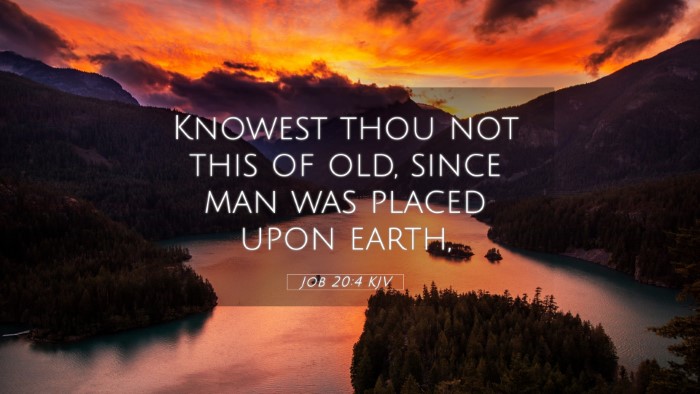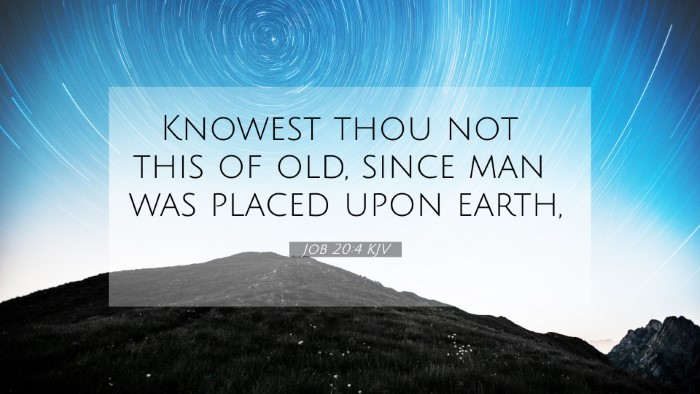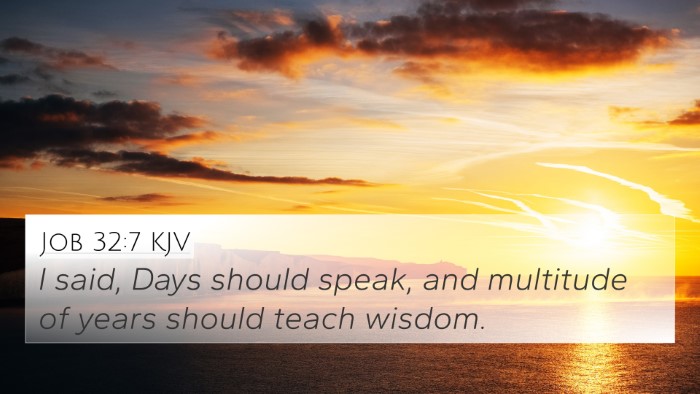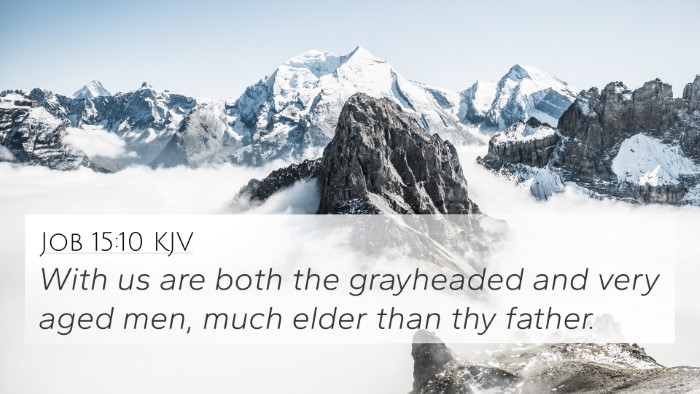Old Testament
Genesis Exodus Leviticus Numbers Deuteronomy Joshua Judges Ruth 1 Samuel 2 Samuel 1 Kings 2 Kings 1 Chronicles 2 Chronicles Ezra Nehemiah Esther Job Psalms Proverbs Ecclesiastes Song of Solomon Isaiah Jeremiah Lamentations Ezekiel Daniel Hosea Joel Amos Obadiah Jonah Micah Nahum Habakkuk Zephaniah Haggai Zechariah MalachiJob 20:4 Similar Verses
Job 20:4 Cross References
Knowest thou not this of old, since man was placed upon earth,
Uncover the Rich Themes and Topics of This Bible Verse
Listed below are the Bible themes associated with Job 20:4. We invite you to explore each theme to gain deeper insights into the Scriptures.
Job 20:4 Cross Reference Verses
This section features a detailed cross-reference designed to enrich your understanding of the Scriptures. Below, you will find carefully selected verses that echo the themes and teachings related to Job 20:4 KJV. Click on any image to explore detailed analyses of related Bible verses and uncover deeper theological insights.
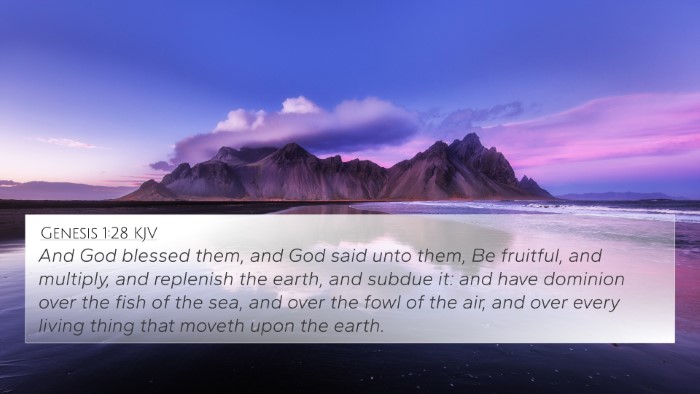
Genesis 1:28 (KJV) »
And God blessed them, and God said unto them, Be fruitful, and multiply, and replenish the earth, and subdue it: and have dominion over the fish of the sea, and over the fowl of the air, and over every living thing that moveth upon the earth.
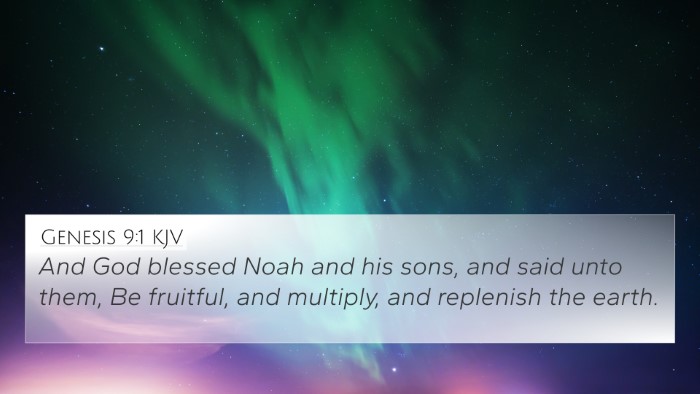
Genesis 9:1 (KJV) »
And God blessed Noah and his sons, and said unto them, Be fruitful, and multiply, and replenish the earth.
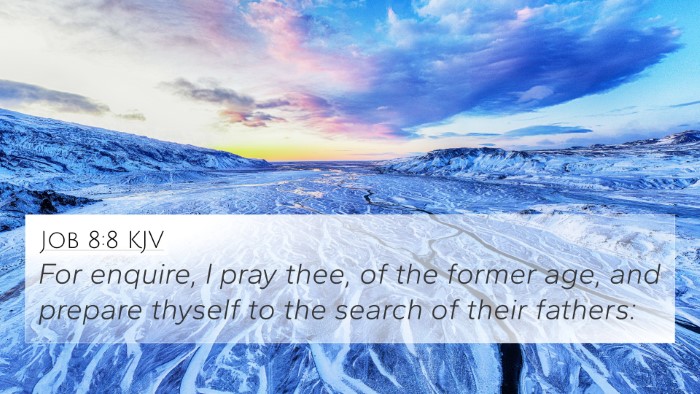
Job 8:8 (KJV) »
For enquire, I pray thee, of the former age, and prepare thyself to the search of their fathers:
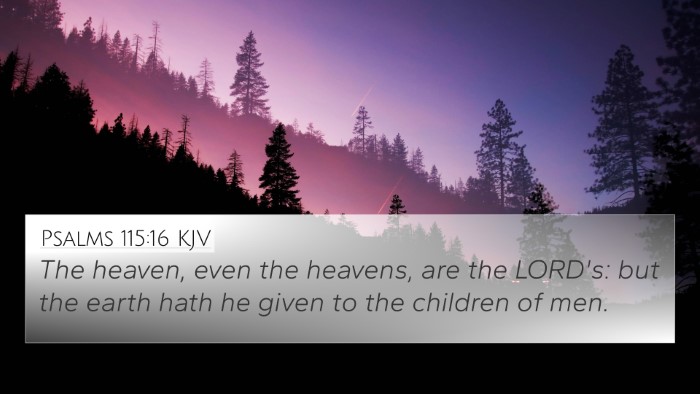
Psalms 115:16 (KJV) »
The heaven, even the heavens, are the LORD's: but the earth hath he given to the children of men.
Job 20:4 Verse Analysis and Similar Verses
Understanding Job 20:4
Job 20:4 states:
"Knowest thou not this of old, since man was placed upon earth?"
Verse Analysis
This verse is rich with meaning and context in the narrative of the Book of Job, where Job’s friends are engaging in a dialogue regarding the nature of wickedness and its consequences.
Contextual Background
In Job 20, Zophar the Naamathite responds to Job's previous statements about suffering and God's justice. This verse emphasizes that the knowledge of divine justice and the fate of the wicked is not new but has been understood since the creation of humanity.
Thematic Exploration
- Divine Justice: The verse reminds readers of the historical and theological understanding that God's law and justice have been evident throughout time.
- Human Condition: Zophar’s words reflect on the nature of humanity’s experience on earth, confronting Job with a stark reality about sin and its repercussions.
- Knowledge and Wisdom: The appeal for understanding in this verse suggests that recognizing the nature of God's justice is crucial to navigating life’s challenges.
Insights from Commentaries
Several renowned commentaries shed light on Job 20:4:
- Matthew Henry: Emphasizes that the understanding of God's judgments is inherent and has been acknowledged since the fall of man. He highlights that God's decrees are not arbitrary but rooted in historical precedents.
- Albert Barnes: Illustrates that Zophar’s assertion relates to the universal understanding among men about the fate of the wicked, suggesting that Job should be aware of this established truth as it pertains to his current suffering.
- Adam Clarke: Points out that the knowledge Zophar refers to is both a spiritual and moral truth understood through observation and experience, reinforcing the idea that the wicked inevitably face judgment.
Cross References
Job 20:4 can be linked to several other Bible verses, which collectively enhance our understanding of its meaning:
- Job 31:3: Discusses the fate of the wicked, reinforcing the theme of divine justice.
- Psalms 1:5: Describes the ultimate judgment awaiting the ungodly, echoing similar sentiments of justice.
- Psalms 9:17: Affirms that the wicked shall be turned into hell, emphasizing a known truth about divine retribution.
- Proverbs 11:21: States that the wicked shall not be unpunished, linking the theme of justice across scriptures.
- Ecclesiastes 3:17: Discusses the universal judgment of God, depicting the idea that justice will ultimately prevail.
- Isaiah 3:10-11: Claims that the righteous shall be rewarded while the wicked shall face consequences.
- Matthew 13:41-42: In the New Testament, Jesus addresses the fate of the wicked, further affirming the concept shared by Job’s friends.
Engaging with Cross-References
Effective cross-referencing can enhance Bible study and the understanding of theological themes. Here are some tools for biblical cross-referencing:
- Bible concordances.
- Bible cross-reference guides.
- Comprehensive Bible cross-reference materials.
- Cross-reference systems to aid in deeper study.
Further Thematic Connections
Job 20:4 engages readers in exploring connections between the Old and New Testaments. In recognizing how themes of justice and understanding God's character play out across scriptures, we can appreciate a cohesive narrative regarding God's nature.
For instance, the discussions about the wicked in James 1:15 resonates with Zophar's insights as both address sin's outcome. Such parallels enhance our understanding through the inter-Biblical dialogue that exists throughout scripture.
Conclusion
Job 20:4 serves as a profound reminder of the timeless truths regarding divine justice and the consequences of sin. By leveraging the insights from public domain commentaries and engaging in thematic cross-referencing, readers can cultivate a richer understanding of scripture's interconnected nature.

